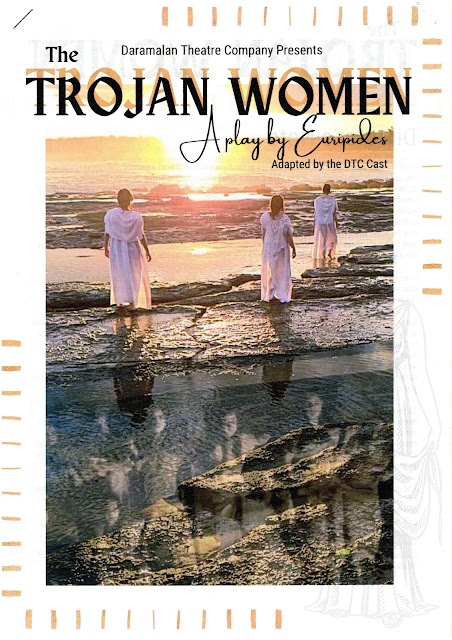The Trojan Women by Euripides, adapted by Daramalan Theatre Company (DTC), Canberra, April 23-30, 2022.
Reviewed by Frank McKone
April 23
Producer/Director – Joe Woodward; Dramaturg – Wynter Grainger;
Lighting & Technical Director – Joey Gardiner; Assistant – Maggie Wilson;
Costumes – Angela Dunn and Gabrielle Adamov;
Music Composer – Jo Philp; Song “A Child Cried” – Tilly Watson.
Initial Research, Scripting & Processing – Amy Goedecke; Assistant – Lilia Bank.
Acting Consultants – Jack Curry & Mel Tsimbas; Special Guidance – Michael Castrission & Ayaz Pazhohish.
Cast:
Andromache – Lucy O’Neill; Athena – Wynter Grainger; Bearer – Daniel Baraniecki; Cassandra – Amy Goedecke; Hecuba 1 – Rose Thiele; Hecuba 2 – Jen Noveski; Hecuba 3 – Lilia Bank; Helen – Vivien Murray; Menelaus – Benjamin Philp; Poseidon – Jack Curry; Talthybius 1 & Podcaster – Brodie Campbell; Talthybius 2 – Ethan Gumbrell; Talthybius 3 – Lachlan Faella; Woman 1 – Mia Burton; Woman 2 – Tilly Watson; Women on Beach – Lilia Bank, Wynter Grainger, Georgie Wiley and Katie Woodward.
________________________________________________________________________________
Joe Woodward in his Director’s Note provides us with the context for this adaptation of The Trojan Women, using – I am guessing – the Gilbert Murray translation into an archaic form of English verse (1905). Woodward refers to the prejudices of a long-ago school principal against racial equality and political activism who set the boundaries, saying “Joe, you and I can discuss these issues but you can’t expect seventeen year olds….” Woodward explains then how “The semantics of ‘free speech’ and developing ‘critical and creative thinking’ become weapons to disguise and hide the real powers and structures that aim to do just the opposite.”
“Euripides knew these same things over two thousand years ago. A Year 11 student from last year…suggested we put on ‘The Trojan Women’ as a wake-up call. So here it is. With students doing all their own interpreting, research and adapting to today’s world and seeking comparisons in the play’s content with the situation in Afghanistan, the production exhibits an organic response that theatre creation rarely sees.”
That student, Amy Goedecke, writes in her Purpose statement “The Trojan Women, as a text, has allowed us to truly see that women in our own world, in times of both war and peace experience the same disgusting disregard for human decency that women experienced in the ancient world.”
Their production combines a kind of ritualised live performance, with videoed scenes on the sea shore (representing where the Greek ships were delayed by the gods’ onshore wind from leaving Troy after its destruction), and scenes from television news of the plight of women under Taliban control in Afghanistan, all presented by a male recording a podcast.
The staging, for a limited audience in a studio setting, without full-scale theatre facilities, was necessarily compromised in terms of sight-lines and the need for more complex lighting, for example.
I have to say that the students took on a Herculean task in learning Gilbert Murray’s arcane lines. I’m not surprised that the meaning and even the storyline was often difficult to grasp. Here’s Poseidon setting the scene with Pallas Athene:
The groves are empty and the sanctuaries
Run red with blood. Unburied Priam lies
By his own hearth, on God's high altar-stair,
And Phrygian gold goes forth and raiment rare
To the Argive ships; and weary soldiers roam
Waiting the wind that blows at last for home,
For wives and children, left long years away,
Beyond the seed's tenth fullness and decay,
To work this land's undoing.
And for me,
Since Argive Hera conquereth, and she
Who wrought with Hera to the Phrygians' woe,
Pallas, behold, I bow mine head and go
Forth from great Ilion and mine altars old.
[ https://gutenberg.ca/ebooks/murrayeuripides-trojanwomen/murrayeuripides-trojanwomen-00-h.html ]
However, the essential point of the production was to prove that these “seventeen year olds” could indeed come to grips with the issues that one-time principal said they couldn’t – or more significantly said they shouldn’t. These young women were perfectly capable of appreciating the “disgusting disregard for human decency” that women still experience around the world, and I am sure understand the importance of role models such as Brittany Higgins and Grace Tame.
In re-enacting Euripides’ cry for such understanding – even just in learning by heart what he wrote and expressing what the Trojan Women felt on stage – they have consolidated their learning through the drama. I trust the male figures, including the podcaster, have absorbed that cry in real life, against the cruelty of their characters in the play.
These students, I hope – and others who see the production – will take up political activism. The eighteen year olds, I trust, are registering to vote right now, ready for May 21st.
Further reading for those who have not yet discovered Pat Barker are her two novels about the Trojan War: The Silence of the Girls (Penguin 2018) and The Women of Troy (Penguin 2021). Much better written for modern times than Gilbert Murray; and filling in the gaps in Euripides from a woman’s point of view.
© Frank McKone, Canberra


No comments:
Post a Comment